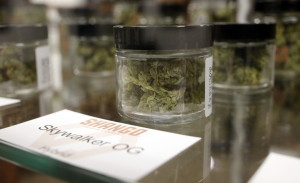Things To Know: How Oregon pot sellers pay taxes

SALEM, Ore. — Oregon raked in $3.48 million from January recreational pot sales — the first month of the state’s 25 percent tax — far outpacing the $3 million projected for the entire year.
Collecting those taxes is no simple task. More than half of Oregon’s recreational pot dealers paying their taxes that month did so in cash, a symptom of the industry’s yearslong struggle for banking access that’s also a big security risk.
In response, the Department of Revenue has transformed a small, unused space at its Salem headquarters into a mini-fortress inaccessible to the public, and from it works a detailed system for dropping off, counting and transporting cash to the bank daily.
Colorado and Washington state have similar operations in place, although officials there don’t like to talk about it for security reasons. Oregon officials, however, gave The Associated Press a mock walk-through of its tax-paying process from the perspective of a pot business.
For them, it starts with a phone call.
HOW IT WORKS
Dialing the Marijuana Tax Program hotline, pot dealers make an appointment for anywhere between 30 minutes to two hours, depending on how much cash they’ll be bringing. They are asked to fill out a voucher with the business’ details and bring it to the appointment for the state’s record-keeping.
Arriving on appointment day at the Department of Revenue in Salem, about a block from the Capitol building, they take an elevator to an upper floor carrying the voucher and a duffel bag, briefcase, shopping bag or whatever works for toting thousands of dollars in cash.
Exiting off a short hallway, the cash-carrier picks up a telephone on the wall, dials a five-digit number as instructed by a sign, confirms the appointment and gets buzzed through a door.
The cash-carrier’s final stop, the Cash Transaction Unit, is a few steps ahead. The carrier approaches a bank teller-like window with two payment stations behind bulletproof glass that’s decked out with security cameras and monitors and a retired police officer standing guard.
Standing there, a faint odor of marijuana — a byproduct of “smelly money” — emanates through the eye-level cracks in the glass used for talking to state workers on the other side.
Cash and the voucher are placed into a bullet-proof metal deposit drop below, and then grabbed by a worker on the other side. The cash-carrier then waits and watches as cash-counting machines crank out totals and workers upload the information electronically.
The money then goes into another bag and is taken to an undisclosed area, where it’s later picked up by an armored car and delivered to the state’s bank.
Department of Revenue officials have likened the operation to a bank, while others see it differently. “This might be more like a casino than a bank,” Sen. Doug Whitsett said in an early February hearing when the operation first came to light.
WHEN IS THIS HAPPENING?
Almost daily. That’s because pot dealers pay taxes monthly, rather than quarterly, and only in Salem for safety reasons.
Many of Oregon’s 300-plus recreational pot dealers are paying in cash. Because electronic payments are not set up yet, the rest send payments by mail in the form of bank checks, money orders and cashier’s checks.
HOW MUCH IS THIS COSTING?
Roughly $3.5 million. The Department of Revenue spent a big chunk of that refurbishing the current site, stocking it with equipment, hiring a dozen employees and beefing up building security with full-time retired police officers. Some unexpected costs included hiring a new armored car service because the previous one was unwilling to transport pot cash.
In anticipating the pot industry’s growth, the department plans to use the rest of its budget to build a bigger space, likely on the main floor, to accommodate more businesses and larger cash transactions.
